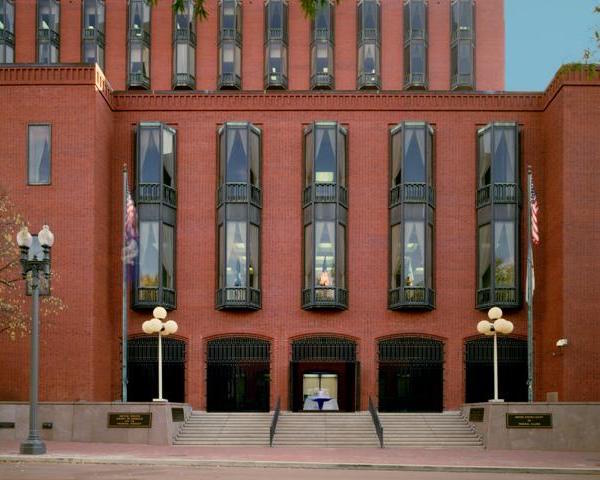 Energy Heating, Ltd. Liab. Co. v. Heat On-The-Fly, Ltd. Liab. Co., Nos. 2016-1559, 2016-1893, 2016-1894, 2018 (Fed. Cir. May 4, 2018) (Before Moore, Hughes, and Stoll, J.) (Opinion for the court, Stoll, J.)
Energy Heating, Ltd. Liab. Co. v. Heat On-The-Fly, Ltd. Liab. Co., Nos. 2016-1559, 2016-1893, 2016-1894, 2018 (Fed. Cir. May 4, 2018) (Before Moore, Hughes, and Stoll, J.) (Opinion for the court, Stoll, J.)
The invention disclosed in the ’993 patent, at issue in this appeal, involves heating water on demand during the fracking process instead of using preheated water. Mr. Hefley, the sole named inventor and founder of Heat On-The-Fly, LLC (“HOTF”), filed the earliest provisional application on September 18, 2009. Prior to the critical date of September 18, 2008, Mr. Hefley and his companies performed on-the-fly heating of water on at least 61 fracking jobs using the system described in the ’993 patent application and collected over $1.8 million for those services. Although Mr. Hefley discussed the requirements of the on-sale bar against patent eligibility with his business partner, he did not disclose any of the 61 fracking jobs to the Patent and Trademark Office (“PTO”). The patent issued on May 8, 2012.
Energy Heating LLC (“Energy”), one of HOTF’s competitors, began using its accused process of heating water in 2012. After HOTF raised the possibility of a patent infringement lawsuit and Energy lost a business contract, Energy sought a declaratory judgment that the ’993 patent was unenforceable for inequitable conduct, invalid as obvious, and not infringed.
The district court granted declaratory judgment, finding the patent unenforceable for inequitable conduct, and denied Energy’s motion for attorneys’ fees under 35 U.S.C. § 285. The Federal Circuit affirmed the court’s finding of inequitable conduct but vacated the denial of attorneys’ fees and remanded on that issue alone.
First, the court did not clearly err in finding that Mr. Hefley’s prior sales and public uses were not experimental. Mr. Hefley admitted that his companies used a water-heating system containing all elements of claim 1 of the ’993 patent before the critical date on at least 61 fracking jobs, none of which were kept secret. No attempt was made to enter into confidentiality agreements or hide the system used to heat water. Mr. Hefley further “kept no notebooks, drawings, plans or explanations of the outcomes” and “expressed no preliminary hypotheses prior to the heating and recorded no conclusions confirming or rejecting the hypotheses.” The primary reason for the prior uses of the patented process was to provide income to Mr. Hefley and his companies, as reflected in over $1.8 million collected for the early work. Even if experimentation was the primary purpose of these prior uses, the experimentation was geared toward economic viability rather than how to meet the claims of the patent.
Second, the court did not abuse its discretion in finding clear and convincing evidence that the inventor knew that the prior uses were material and specifically intended to deceive the PTO by not disclosing them. The court had sufficient evidence – including evidence of 61 commercial sales dating back to 2006 and no contemporaneous evidence of experimentation – to disbelieve Mr. Hefley’s testimony to the contrary. The Court further did not err in excluding testimony of Mr. Hefley’s prosecuting attorney that the attorney himself decided the uses to be experimental and the disclosure unnecessary. HOTF asserted attorney-client privilege during discovery, when already on notice of a likely inequitable conduct defense. The attempted waiver close to trial was untimely and would have prejudiced Energy. Because HOTF procured the ‘933 patent through equitable conduct, the Court did not reach the issues of obviousness, claim construction, and divided infringement.
Finally, the Court vacated and remanded the denial of Energy’s motion for attorneys’ fees. The Court reaffirmed that district courts may award attorneys’ fees after a finding of inequitable conduct but are not required to do so. A court denying attorneys’ fees following a finding of inequitable conduct must, however, articulate a basis for doing so. Here, the Court could not determine whether the court abused its discretion in denying attorneys’ fees absent further explanation of its reasoning. The Court thus vacated the denial and remanded for reconsideration on that issue alone.
Take Away
In order to defeat the on-sale bar, experimental use must be geared toward the patent claims rather than the economic viability of a patented process. Keeping early uses confidential is key to a finding of experimental use. Evidence of income from early uses indicates the invention was on sale. A finding of inequitable conduct generally supports a grant of attorneys’ fees, unless accompanied by a court’s specific reasoning to the contrary.
[Troutman-Ad]
[Troutman-About]

![[IPWatchdog Logo]](https://ipwatchdog.com/wp-content/themes/IPWatchdog%20-%202023/assets/images/temp/logo-small@2x.png)


![[Advertisement]](https://ipwatchdog.com/wp-content/uploads/2024/04/Patent-Litigation-Masters-2024-sidebar-early-bird-ends-Apr-21-last-chance-700x500-1.jpg)

![[Advertisement]](https://ipwatchdog.com/wp-content/uploads/2021/12/WEBINAR-336-x-280-px.png)
![[Advertisement]](https://ipwatchdog.com/wp-content/uploads/2021/12/2021-Patent-Practice-on-Demand-recorded-Feb-2021-336-x-280.jpg)
![[Advertisement]](https://ipwatchdog.com/wp-content/uploads/2021/12/Ad-4-The-Invent-Patent-System™.png)







Join the Discussion
No comments yet.